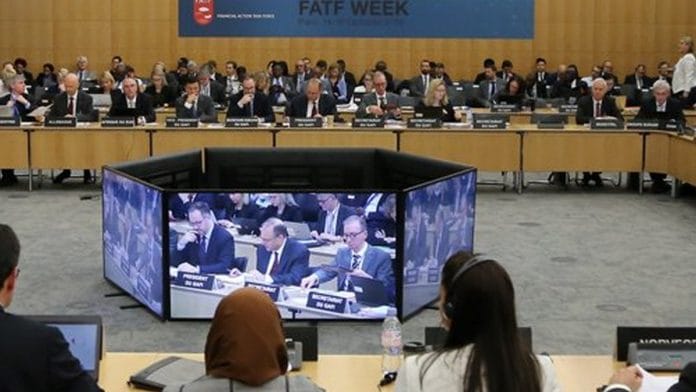New Delhi: As the Financial Action Task Force (FATF) hauls Pakistan over the coals for terror financing, India gets set for the anti-money laundering watchdog’s audit in autumn later this year.
While the FATF left Pakistan in its ‘grey list’ this week for failing to curb terror funding, India will undergo the watchdog’s mutual evaluation process — a review of the country’s anti-money laundering and counter-terrorist financing system against internationally agreed standards.
In the previous peer review in 2010, India was found to be “largely compliant” on the 40 parameters set by the FATF.
Now, the Enforcement Directorate (ED), India’s economic intelligence and prosecuting agency to probe financial fraud, is gearing up for the same process.
According to a government official, a team of ED officers have pulled out old records on number of charge-sheets filed, convictions secured, cases registered, investigations completed and properties attached post 2013-14, when the last follow-up report was filed.
In the upcoming audit, FATF will evaluate India’s preparedness to deal with financial crimes, the official said on condition of anonymity.
“The FATF will basically look at three things — if there are legislative provisions in place to fight financial crime, the effectiveness of the agencies and if there is sufficient international cooperation with India on curbing these crimes,” the source said.
In an emailed response to ThePrint, the FATF said India’s review process is likely to be completed by the end of 2021.
“The India mutual evaluation is due to start in the autumn of this year. It is expected to last around 18 months with an onsite visit expected in Spring 2021. The evaluation is expected to be completed by late 2021,” said the watchdog.
Also read: These are the parameters on which Pakistan has failed to meet FATF targets
How ED will show India’s compliance
To demonstrate its efficacy, the ED will showcase how it secured 11 convictions in just eight months last year, as opposed to three between 2002 — when it started investigating criminal cases under the Prevention of Money Laundering Act (PMLA) — and 2017.
According to the source, the agency will also show that there has been no acquittal in any of the PMLA cases.
Moreover, the ED will prove how it took up high-profile cases, filed charge-sheets in many long-pending cases, attached properties in a series of cases worth Rs 58,000 crore, moved applications, and even secured extraditions in the last two years, said the offiical.
“ED was the first to move an extradition request for businessman Nirav Modi for his alleged involvement in the multi-crore Punjab National Bank (PNB) fraud case, and was also the first to trace the location of the international business head of Gitanjali Gems, Sunil Varma, to the US. Request for his extradition too was initiated by the agency,” the official said.
Further, the extradition of Rajiv Saxena, an alleged accused in the Rs 3,600-crore AgustaWestland helicopter deal, was secured from the United Arab Emirates, along with businessman Deepak Talwar, also wanted in a money laundering case.
Christian Michel, an alleged middleman in the chopper deal, was also extradited from Dubai.
“The records will be looked into by FATF and we are certain that their report will be positive. Even the NIA (National Investigation Agency) has successfully made arrests and filed charge-sheets in the Jammu and Kashmir terror-financing case, which too will be taken into account,” added the official.
What the FATF looks at
The global anti-money laundering watchdog’s mutual evaluation checks if the steps taken by a country to curb money laundering and terrorist financing are adequate and up to the prescribed standards.
This includes checks over whether financial institutions report suspicious transactions, authorities use financial intelligence reports to probe money laundering and terrorist financing activities, those committing these crimes are probed and prosecuted, properties acquired from proceeds of crime are confiscated, and steps are taken to ensure that all terrorists are prevented from raising funds.
As of June 2013, India was considered to be ‘largely compliant’ with the prescribed standards after it took steps to address the deficiencies flagged by the FATF.
For this, the government introduced changes to PMLA, the Unlawful Activities (Prevention) Act, the banking laws, and complimented the steps with enforceable circulars by regulators for financial institutions to become compliant.
Meanwhile, Pakistan has remained on FATF’s terror-financing ‘grey list’ since June 2018. The grey list entails immense scrutiny by countries in the 39-member FATF. Islamabad’s inclusion in the list is impacting foreign capital inflow into the country.
Also read: Pakistan should be blacklisted by FATF, isolated diplomatically: CDS Gen Bipin Rawat






